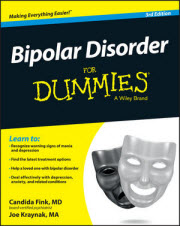Posted May 15, 2013
Growing up bipolar disorder was always synonymous with negativity and judgment. Based on my personal experience, it still happens today, but less and less. I never expected to be diagnosed bipolar, but it happened at the age of 21. I was shell shocked and reacted poorly. I simply just wanted to be like everyone else and could not grasp the fact that my life was forever changed and that I needed to adjust in order to save my life.
The two worst symptoms were my wide variety and always changing range of emotions and schizophrenia. The first two years I actually believed that these internal voices I was hearing were real people and actually followed some of “their” advice. I was fearful of the “voices” and was afraid that I was in physical danger and or that “they” would reveal my deepest darkest secrets. The emotional issues made me feel instantly depressed or instantly manic on many occasions. This was my life.
It took the proper medications, common sense, and the realization that this harsh reality existed permanently if nothing changed for me to get better. Through my support group, I have embraced the concept that if you do not make the right changes in your life, you cannot expect anything more than your situation to remain the same. Today I still fall into this trap.
The icing on the cake and multiplier of my emotional distress is that my father and older sister were extremely troubled, and little has changed in this department. For such a long period of my life I blamed troubled family members, a tough childhood, and bipolar disorder for poor decisions that I made individually. Reaching this conclusion made me a better person, but ultimately put more responsibilities on me. I became enamored with this movie quote stating how it is easier to be a loser, using excuses and crutches, than a winner, carrying the burden of personal responsibility on your shoulders. This quote resonates with me on so many levels.
Today, I am not cured. I still call friends countless times to help manage my emotions. I sometimes need to see the doctor early to adjust my medications, which is not my fault but a part of the disorder. Once a year I get frustrated and do not take my meds for days playing God. Lastly, I have struggled mightily dealing with my father’s death, older sister’s behavior, and other life moments. On top of curtailing an emotional rollercoaster ride, these situations make taking ownership for my life and the decisions I make twice as hard.
I have accomplished much the last 5 years. I achieved a bachelor’s degree from a quality university. I have mentored two kids from Englewood, a troubled sector of Chicago. I have worked multiple jobs successfully. Lastly, I have volunteered helping other bipolar patients. I plan on continuing to fight this disorder with all the energy I can muster up.

Thank you for empowering others by sharing your story. Emily & the Zoellers